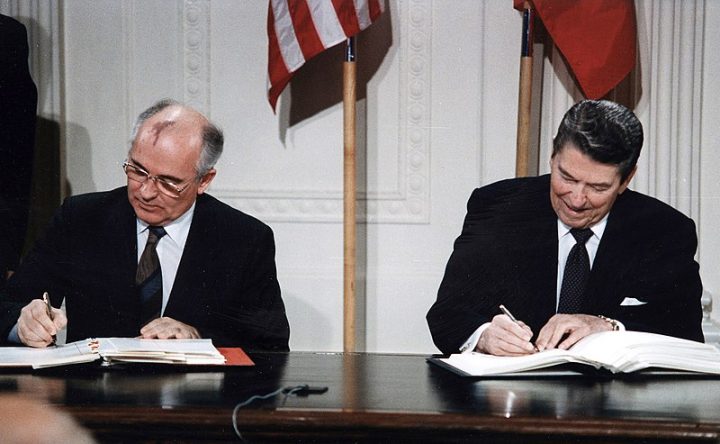This opinion piece written by Rafael Poch-de-Feliu[1] was published on his blog in Spanish with the original title “The discreet burial of the INF.”
The most crucial nuclear disarmament agreement for Europe and Europeans is going down the toilet in three weeks time in the face of the abhorrent indifference of our societies.
Between December 1987 and July 1991, the USSR and the United States signed unprecedented disarmament agreements that radically changed the international situation. In December 1987, Gorbachev and Reagan signed the INF agreement in Washington, D.C., on intermediate nuclear forces with a range between 500 and 5500 kilometres. That agreement involved the elimination of the Euromissiles: 826 medium-range and 926 short-range by the USSR, and 689 and 170, respectively, by the United States.
Although it represented only 5% of the joint nuclear arsenals, the agreement saved the Europeans from a nightmare and was a start for something else. Behind it was the impressive “peace movement,” which, particularly in Germany, mobilized European societies with unusual vigour and energy. In the same vein of common sense, in July 1991 Bush and Gorbachev signed the first START agreement in Moscow for a 40% reduction in their respective strategic, i.e. long-range, arsenals.
Furthermore, the agreement on the reduction of conventional forces in Europe (CFE) had been signed in Paris in November 1990, and the USSR immediately initiated the withdrawal of troops from Hungary, Czechoslovakia, the German Democratic Republic and Mongolia. The importance of all this cannot be overstated: the climate was altered in a twice-world war-torn Europe in the 20th century, and Moscow’s relations with the United States and China were demilitarized and normalized.
All this is now going to shit on the initiative of the United States, at the hands of criminally insane people like John Bolton. On February 1, Washington announced its abandonment of the INF agreement. The pretext is the accusation that Russia had violated this treaty, an argument that our media has spread profusely. The simple reality is that the United States violated the INF from the very moment when, years ago, it deployed the famous “anti-missile shield” near Russia’s borders. After repeated protests from Moscow, always ignored, Russia took measures in response which are now those mentioned to justify the abandonment by the United States.
The procedure for withdrawing from the agreement has a calendar of six months which ends in three weeks on the 1st of August. This is very bad news for Europeans, because we will have nuclear Euromissiles again. European politicians reacted to this issue immediately.
In July 2018 Chancellor Angela Merkel declared at a meeting of NATO heads of state and government that the INF was a “decisive agreement for Euro-Atlantic security”. Seven months later, at the Munich Security Conference, the same chancellor called the abandonment of the agreement “inevitable”. The vilified Putin proposed, back in February, to devote the six-month exit period for the agreement to renegotiate the matter jointly with the United States and China, and NATO Secretary General Jens Stoltenberg announced that he would do everything possible to “save the INF”. Nobody really did anything.
All of this is dramatic, but even more so if you look at what the German commentator Leo Ensel defines as “a disastrous popular front of ignorance, indolence and convenience”. Social passivity in the face of this dangerous disaster, which will probably be followed by the termination of the START agreement when it comes up for renewal in 2021, is unheard of. In the early 1980s, all of Germany revolted against the Euromissiles. Even in East Germany there was a “peace movement” protesting against the deployment of the Soviet SS-20 and not just against the American Pershing. The Evangelical Church, in the two Germanys, was involved in the campaign for disarmament. The German Greens, who were then a left-wing party that had just arrived on the scene, with nothing to do with the current warmongering party of neoliberal bourgeoisie, had a leading position. In England the Campaign for Nuclear Disarmament (CND) was underway, a movement led at the time by historian E.P. Thompson which had been founded in the 1950s by the magnificent Bertrand Russell…
Where are today’s equivalents, those intellectuals, those civil initiatives? Maybe watching silly series on TV. What about the young people? Even the stupendous Fridays for Future initiative has not been able to link this concrete nuclear danger with the protest against climate change. In three weeks there is a tremendous step backwards in our security and nobody here knows about it.
[1] Rafael Poch-de-Feliu (Barcelona, 1956) was correspondent for La Vanguardia for twenty years in Moscow (1988-2002) and Beijing (2002-2008). Then he was correspondent in Berlin from 2008 to 2014. Before that, in the 1970s and 1980s, he studied contemporary history in Barcelona and West Berlin, he was the Spanish correspondent for Die Tageszeitung, editor of the German press agency DPA in Hamburg and itinerant correspondent in Eastern Europe (1983-1987).
Author of several books; on the end of the USSR (translated into Russian, Chinese and Portuguese), on Putin’s Russia, on China, and a small collective essay on Germany’s Eurocrisis (translated into Italian).
In January 2018 he was dismissed as La Vanguardia correspondent in Paris.






